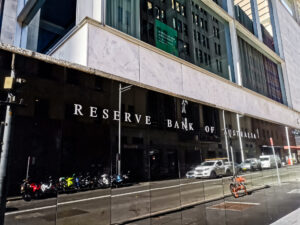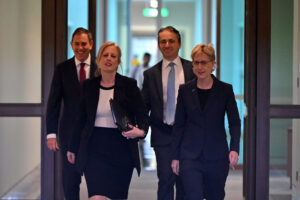January 2026
Australia is one of the richest countries in the world. Our governments act as if we are poor
Australia’s health system is in crisis and, while the tensions over funding between state and territory leaders and the Commonwealth is at an all-time high, people desperately waiting for medical help need real action, not performative posturing.
December 2025
The welfare system isn’t just on fire, it’s burning out of control
The problem with having pattern recognition is that you can always see the fires before they start.
Liberals twist RBA remarks to sell a false narrative on public spending
Last week the Liberal Party shamefully misquoted the head of the Reserve Bank in a weak attempt to justify its criticism of government spending.
The great gas rip off: how the government can stop us all getting burned
The Albanese government could soon intervene to start fixing one of the biggest ongoing public policy fiascos in this country’s history: Australia’s rampant, uncontrolled gas export industry.
When ‘common sense’ cuts are code for a cruel con job
The greatest trick neoliberalism ever pulled was convincing people government intervention shouldn’t exist.
November 2025
Australia’s health system is in intensive care, and the GST flatline is to blame
Australia’s health system needs intensive care, and so does the tax system that funds it.
Who needs world-changing, life-saving science when you’ve got rugby league?
If you’ve ever used Aerogard, the announcement this week that CSIRO would cut another 350 jobs should alarm you.
Coalition offers crash course on staying in opposition for forever
If the Coalition’s aim is to stay in opposition, it’s doing a bang-up job.
October 2025
Dropping planeloads of crap on people would be less toxic than gas industry’s current output
When Donald Trump posted an AI video of himself in a plane, spraying crap all over Americans, I couldn’t help but admire his transparency about the way he treats the American people.
Health funding is one of our trickiest issues – here’s a politically sweet fix
For the past few years, a growing problem has put healthcare budgets under increasing stress. State and territory governments have been trying to do more with less, and it is all starting to come apart at the seams. Extra money for healthcare during the pandemic hid the problem for a while. But, with those emergency
Shame and harm at every JobSeeker turn – and now with added AI slop
“Single JobSeeker [payment] just hit $400 a week. Let me know how you’d go if you were getting that little and were randomly not paid.” This comment, from the people behind Nobody Deserves Poverty, points to the ignored cruelty at the heart of one of Australia’s most shameful open secrets. The mutual obligations system –
A closer look at the ANU books reveals a hard truth about these job cuts
The leadership of the Australian National University (ANU) has been claiming it is in financial crisis, with the former vice-chancellor declaring the institution was living beyond its means.
Governments keep making our housing crisis worse – and they’ve just done it again
Back in 2003, then prime minister John Howard spoke to ABC radio Brisbane and made the infamous claim that no one was approaching him on the street to complain about their house prices going up.
September 2025
Fearful and frozen: Why the Reserve Bank continues to err on rates
The RBA’s failures have real consequences. It should go back and closely reread the recommendations of the RBA review, particularly the ones that encourage it to open up to new and diverse viewpoints.
Bell’s departure is overdue, but this crisis is not all her fault. Here’s why
Genevieve Bell, vice-chancellor of the Australian National University (ANU), has announced her resignation. Many will welcome this news.
Koala sanctuary may come with diabolical trade off
Environmentalists rejoiced on the weekend when the NSW Government announced it planned to incorporate 176 thousand hectares of forest into the long-proposed Great Koala National Park.
As fascism rears its ugly head, we are trapped between the craven and the unwilling
Let’s take a bit of a look at responsibility shall we?
Imagine if a business or federal department acted like this. Here’s why unis get away it
The leaders of Australian universities are enjoying the best of both worlds when it comes to the way they are regulated, but students are getting the worst.
If the Productivity Commission was serious about productivity, it would not target EVs
The Productivity Commission’s ideological slip is showing, and as a result, the advice it is giving the government is as confused as it is unproductive.
August 2025
Who’s going to stand up and make Nazis ashamed again?
A “March for Australia” rally sounds benign, but people who plan to attend the “March for Australia” rallies around the country on Sunday will almost certainly be marching alongside white supremacists and neo-Nazis.
Is population growth driving the housing crisis? Here’s the reality
Population growth is in the news again. The usual suspects are trying to whip up a scare campaign about immigration. So, let’s look at the actual numbers and put them into context.
Australia’s capital class remains too focused on profit to truly address productivity
A key problem with the economic roundtable is many of those hauled in to fix Australia’s productivity black hole have spent the past 25 years gunning for more privatisation.
Economic round table recycles broken ideas
A genuine debate about how to boost Australia’s productivity should bring in a wide range of groups to talk about a wide range of options, but, alas, that’s not what happened in Canberra last week.
Roundtable was a rare chance for reform. Instead we got small ideas
The three-day economic roundtable is over. After all the colour and movement, what did we get?
Is Anthony Albanese’s reform agenda bold enough for Australia?
Labor has never been in a better position to implement its national policy platform.
Want to lift workers’ productivity? Let’s start with their bosses
Business representatives sit down today with government and others to talk about productivity. Who, according to those business representatives, will need to change the way they do things?
Tasmanians are still in the dark about what is being done to prevent the Maugean skate’s extinction
Latest decision on salmon farming almost certain to be catastrophic for endangered species, writes Eloise Carr
Gripped by an ‘Abundance fever’ that makes us see only red
Canberra is in the grip of Abundance fever, a virus that threatens to overwhelm public policy with a diagnosis of overregulation. For those afflicted, the treatment is to maintain the status quo, but with the sheen of progressivism. The Abundance agenda is being presented as a panacea for all of America’s problems, and therefore also Australia’s problems. It’s shaping
Delayed RBA cut is welcome, but borrowers are still lagging
The RBA has cut interest rates – five weeks too late.
The Productivity Commission is floating AI copyright exemptions – with worrying implications for Australian authors and publishers
In an interim report released overnight, Harnessing data and digital technology, the Productivity Commission has floated a text and data mining exception for the Australian Copyright Act. This would make it legal to train artificial intelligence large language models, such as ChatGPT, on copyrighted Australian work. AI training would be added to the list of
General Enquiries
Emily Bird Office Manager
mail@australiainstitute.org.au
Media Enquiries
Glenn Connley Senior Media Advisor
glenn.connley@australiainstitute.org.au





























